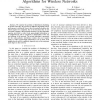Free Online Productivity Tools
i2Speak
i2Symbol
i2OCR
iTex2Img
iWeb2Print
iWeb2Shot
i2Type
iPdf2Split
iPdf2Merge
i2Bopomofo
i2Arabic
i2Style
i2Image
i2PDF
iLatex2Rtf
Sci2ools
106
click to vote
INFOCOM
2007
IEEE
2007
IEEE
Low-Complexity Distributed Scheduling Algorithms for Wireless Networks
— We consider the problem of distributed scheduling in wireless networks. We present two different algorithms whose performance is arbitrarily close to that of maximal schedules, but which require low complexity due to the fact that they do not necessarily attempt to find maximal schedules. The first algorithm requires each link to collect local queue-length information in its neighborhood, and its complexity is independent of the size and topology of the network. The second algorithm is presented for the node-exclusive interference model, does not require nodes to collect queue-length information even in their local neighborhoods, and its complexity depends only on the maximum node degree in the network.
Related Content
| Added | 03 Jun 2010 |
| Updated | 03 Jun 2010 |
| Type | Conference |
| Year | 2007 |
| Where | INFOCOM |
| Authors | Abhinav Gupta, Xiaojun Lin, R. Srikant |
Comments (0)

